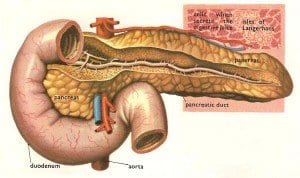
A trial was conducted by IRCM researchers (led by endocrinologist Dr. Rémi Rabasa-Lhoret) that compared a dual-hormone artificial pancreas with conventional diabetes treatments that use an insulin pump and showed improved glucose levels and lower risks of hypoglycemia.
The results showed that the artificial pancreas can have a huge impact where treatment is concerned for people who have been diagnosed with type 1 diabetes.
When it comes to the artificial pancreas, it is an automated system that stimulates the normal pancreas. It concurrently adapts to insulin delivery through changes in glucose levels. Tested by IRCM, the dual-hormone artificial pancreas controls glucose levels through delivering insulin and glucagon (based on continuous glucose monitor readings and is guided through an advanced algorithm.
“We found that the artificial pancreas improved glucose control by 15 per cent and significantly reduced the risk of hypoglycemia as compared with conventional insulin pump therapy. The artificial pancreas also resulted in an 8-fold reduction of the overall risk of hypoglycemia, and a 20-fold reduction of the risk of nocturnal hypoglycemia.” said engineer Ahmad Haidar, first author of the study and doctoral student in Dr. Rabasa-Lhoret’s research unit at the IRCM and at the Department of Electrical and Computer Engineering at McGill University.
Diabetes is a growing disease all around the world and while type 2 diabetes is often more common, the rate of type 1 diabetes is growing as well. Those who have type 1 diabetes have to manage their blood glucose regularly. They must remain in a very particular target range. If they are not, then certain complications can start to happen such as blindness and kidney failure, which are related to high blood sugar. Also, there are many risks that come with hypoglycemia (low blood sugar) such as confusion, disorientation and even in some severe cases, loss of consciousness and a coma.
Director of the Obesity, Metabolism and Diabetes research clinic at the IRCM Dr. Rabasa-Lhoret reported, “Approximately two-thirds of patients don’t achieve their target range with current treatments. The artificial pancreas could help them reach these targets and reduce the risk of hypoglycemia, which is feared by most patients and remains the most common adverse effect of insulin therapy. In fact, nocturnal hypoglycemia is the main barrier to reaching glycemic targets.”
“Infusion pumps and glucose sensors are already commercially-available, but patients must frequently check the sensor and adjust the pump’s output,” says Mr. Haidar. “To liberate them from this sizable challenge, we needed to find a way for the sensor to talk to the pump directly. So we developed an intelligent dosing algorithm, which is the brain of the system. It can constantly recalculate insulin dosing based on changing glucose levels, in a similar way to the GPS system in a car, which recalculates directions according to traffic or an itinerary change.” said Mr. Haidar.
“The system we tested more closely mimics a normal pancreas by secreting both insulin and glucagon. While insulin lowers blood glucose levels, glucagon has the opposite effect and raises glucose levels. Glucagon can protect against hypoglycemia if a patient with diabetes miscalculates the necessary insulin dose.” said pediatric endocrinologist and outgoing Director of the Insulin Pump Centre at the Montreal Children’s Hospital, Dr. Laurent Legault.
Dr. Rabasa-Lhoret said, “Our work is exciting because the artificial pancreas has the potential to substantially improve the management of diabetes and reduce daily frustrations for patients. We are pursuing our clinical trials to test the system for longer periods and with different age groups. It will then probably be introduced gradually to clinical practice, using insulin alone, with early generations focusing on overnight glucose controls.”